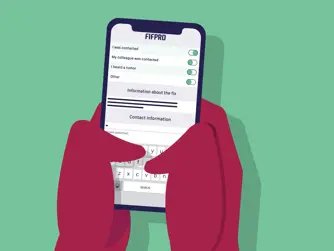News
Peruvian union SAFAP introduces Red Button app for more than 900 footballers

- As of Friday, Peru's Liga 1 and Liga 2 will be able to use the application created by FIFPRO to combat sport manipulation
- It will be available to some 950 professional footballers in Peru, who can report match-fixing approaches safely and anonymously
- Roberto Silva, president of the Peruvian union, reveals a club took one of its players "to a certain place where they put a gun to his leg"
Friday 26 January marks the beginning of the 2024 Peru Liga 1 campaign, but it will not be just another edition like so many others: from this year, footballers from the 18 participating teams will be able to report any match-fixing attempts through the Red Button app, the tool developed by FIFPRO to combat sports manipulation.
And the Red Button will not just be available for the country's top flight: players of the 18 Liga 2 teams will also have access to the app.
In the last months of 2023, the issue of match-fixing gained notoriety in the public discussion of Peruvian football. The trigger was the request for a match investigation by the second division club Pirata to the Peruvian Football Federation after losing 11-0 to Los Chankas.
Days later, footballers Mario Tajima and Reimond Manco, also from the second division, denounced "mafias" linked to match-fixing and asked the authorities for protection. Roberto Silva, president of the Peruvian Professional Footballers' Association (SAFAP), revealed in an interview that a club took one of its players "to a certain place where they put a gun to his leg".
FIFPRO spoke to Silva to find out more about the Peruvian situation and how Red Button will be applied.
FIFPRO: Roberto, what made you decide to implement Red Button in Peru's first and second division?
Roberto Silva: We have known about the existence of the Red Button app for quite some time. We were waiting to see when it would be possible here. We have been fighting against match-fixing for a long time. With the boost given by the bookmakers and the way things are developing, this was beginning to have a worrying presence. The talks we had with the players when we went to visit them at their clubs, warning them of the consequences of participating in this, were no longer enough. By 2023, the rumours of involvement in betting, or the feeling that people are not sure if there has really been anything going on, started to generate a problem that made us accelerate these campaigns and we were concerned about promoting it in other ways.

And that's where Red Button comes into the picture...
The way we see the most viable way to stop this from progressing any further, but on the contrary, to go backwards, is to start reporting it. Players who have information should report it and know that they have the support and protection to do so anonymously, if they want to. Let them know that they do it through a mechanism with which they feel protected because we have had cases here where we managed to convince a footballer to report, in 2019, and although it seems incredible, the investigation ended with a two-year suspension for the whistleblower. I still don't believe it. It was the system's way of saying "don't even think of peeping". We were able to get that matter lifted but the whole situation was very sad. That forced us to go another route.
How were the meetings with the players?
We did this between September and November last year, visiting each club. We explained to them that we wanted to activate the Red Button app to start using it at the beginning of this year. We have asked them to please report, whether they have a little or a lot of information. If you have but 15 players from different clubs give just a little, the investigator can start to put something together with those different little pieces and come to a conclusion that finds those responsible – and get them out of the system. The players listen to you, some of them asked questions because it is a hot topic, some of them consulted us privately after the meeting was over.
Last year there were some public condemnations by footballers against match-fixers...
I did it myself in an interview when players from one particular club told us the story that the same club would take them to sit somewhere where they would have a gun and tell them "you have to lose". Crazy stuff! They were no longer rumours, they were true stories of people telling you. And it was part of the talk we had with them. This is a system in which the players end up being the last link, as we call them the useful fools in the system of corruption. The footballers are the ones who end up being affected because they can be denounced and even end up in prison. It is a whole system that involves many people and, if we don't nip it in the bud, it will end up eating us up. We have to make the players understand that all the effort it took to get to the cream of Peruvian football doesn't make sense to risk it for a few thousand soles [Editor's note: the currency of Peru] that they offer you for losing or for a couple of throw-ins or corners.
What is the Red Button app?

It seems like a lot of work that SAFAP is doing on this problem. Is this the case?
It's complex. I have friends who have said to me "hey, I heard you talking about this complaint, be careful where you are going". They are worried about me. We are going to do everything in our power. We don't sanction and we can't generate an investigation but we can reach out to the players with the message that we have to take care of our football. We can do something.
Peruvian law does not criminalise match-fixing, so what can be done to address this?
To fight against match-fixing, as a guild and as a system we have to make it a crime. In 2022 we supported a bill that was structured by a law firm in Lima. Last year we got in touch again to see if it had been presented in Congress and then we found out, I don't know if it was because of our question or not, that a congresswoman had finally presented this bill. It's a big first step but I don't think the timeline is short. If they tell me that it will come out in 2024, I would be satisfied.
